Disclosure: We may get commissions for purchases made through links in this post.
Are you hesitant to use spray sealant on your pavers? Don’t worry! It's actually one of the best ways to seal your pavers. We did research on this topic and we have everything you need to know right here.
One way to seal your pavers is by using a spray sealant. Professionals recommend using this rather than rollers because pump sprayers are more reliable and effective. There are different kinds of sprayers you can use:
- Standard pump garden sprayers
- Solvent-resistant pump sprayers
- Airless and HVLP sprayers
- Battery-powered pail pump spray system
Sealing your pavers can be ineffective if not done properly. There are several materials you can use to seal your pavers. We're here to help you learn more about which instrument to use and how to apply it.
![Vibrant Red Paver Stone Path, Can You Spray Paver Sealer? [How To Apply It]](https://pavingplatform.com/wp-content/uploads/2022/04/Can-You-Spray-Paver-Sealer-How-To-Apply-It.png)
Can you use a spray sealant?
Paving stones are a prominent feature of your patios, driveways, and walkways. As a homeowner, you want to make sure your pavers have the best look possible. How do you achieve that?
The first thing you have to do after installing pavers is to apply a sealant. Sealants protect your stones from moisture and deterioration. Using a spray sealant is one way to seal your paving stones.
It is possible to have pavers that will last for years and resist harsh weather conditions. You can achieve this by sealing your paving stones properly.
But before doing this, remember that there are certain materials you should use. Choosing the best one will ensure the protection of your pavers for years to come.
Spray Sealant Vs. Rollers
Experts recommend spray sealants as the best way to seal your pavers. Yes, using rollers is much easier, but these materials can actually have some repercussions.
The biggest downside when using rollers on pavers is that the rollers can remove the joint sand and spread it over the pavers’ surface. This happens especially if the paving joints are too wide.
Another downside of using rollers is that it's harder to control the amount of sealer soaking the paver joints.
On the other hand, you won't encounter these problems when using spray sealants. This allows the sealant to spread and soak evenly into the joints.
Keep in mind that it is better to apply spray sealant during a windless day. This will make the work easier for you.
How to Apply Paver Sealer
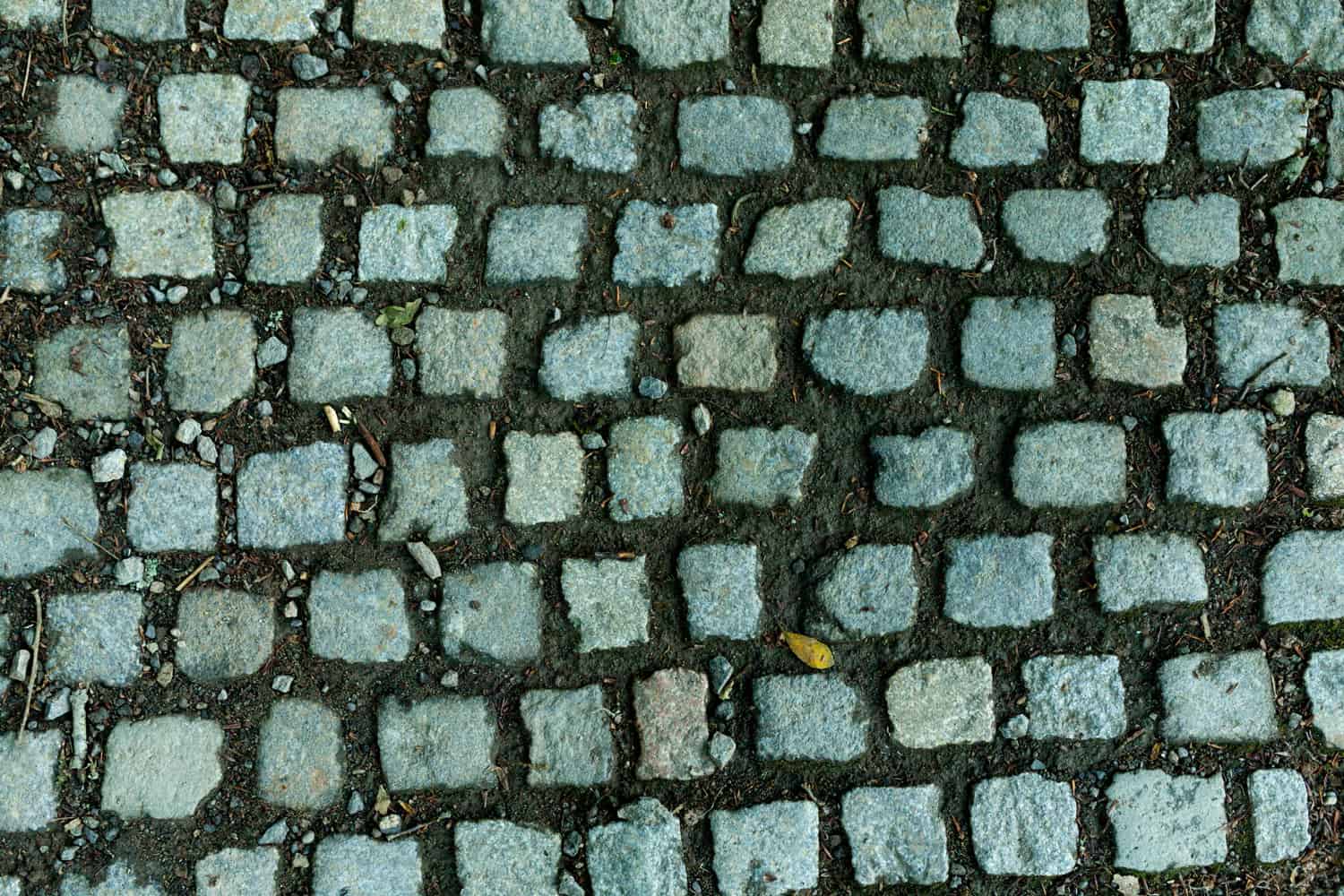
Step 1
Before applying a sealant, you need to clean the area first using appropriate cleaning materials for removing oil, mold, mildew, and efflorescence. Remember, it is not advisable to apply a sealant over efflorescence.
Remove any stains that are visible on your pavers. You can use chemicals or other cleaning materials to get rid of them. For severe stains, simply pour a cleaning liquid onto the stain and let it sit for about 5 minutes before rinsing.
Check out this outdoor cleaner on Amazon.
Step 2
The next step is to apply the sand in between the paving joints. Once you've finished doing this, you need to clean the area off and remove dust and debris with a leaf blower.
Step 3
After putting sand in between the paver joints, you can now apply a coating of paver sealer with your sprayer. Make sure that the joints down to the sand are getting enough sealant.
Concentrate on spraying in between the joints. This will ensure the protection of your paving stones. Excess sealers on the surface of your pavers must be brushed back into the joints. You must apply a second coating for additional protection.
Step 4
Maintenance is important! Make sure to keep your pavers clean as much as possible. Occasional wiping, sweeping, rinsing and cleaning is one way to ensure the classic and timeless beauty of your paving stones.
What are the two types of paver sealants?
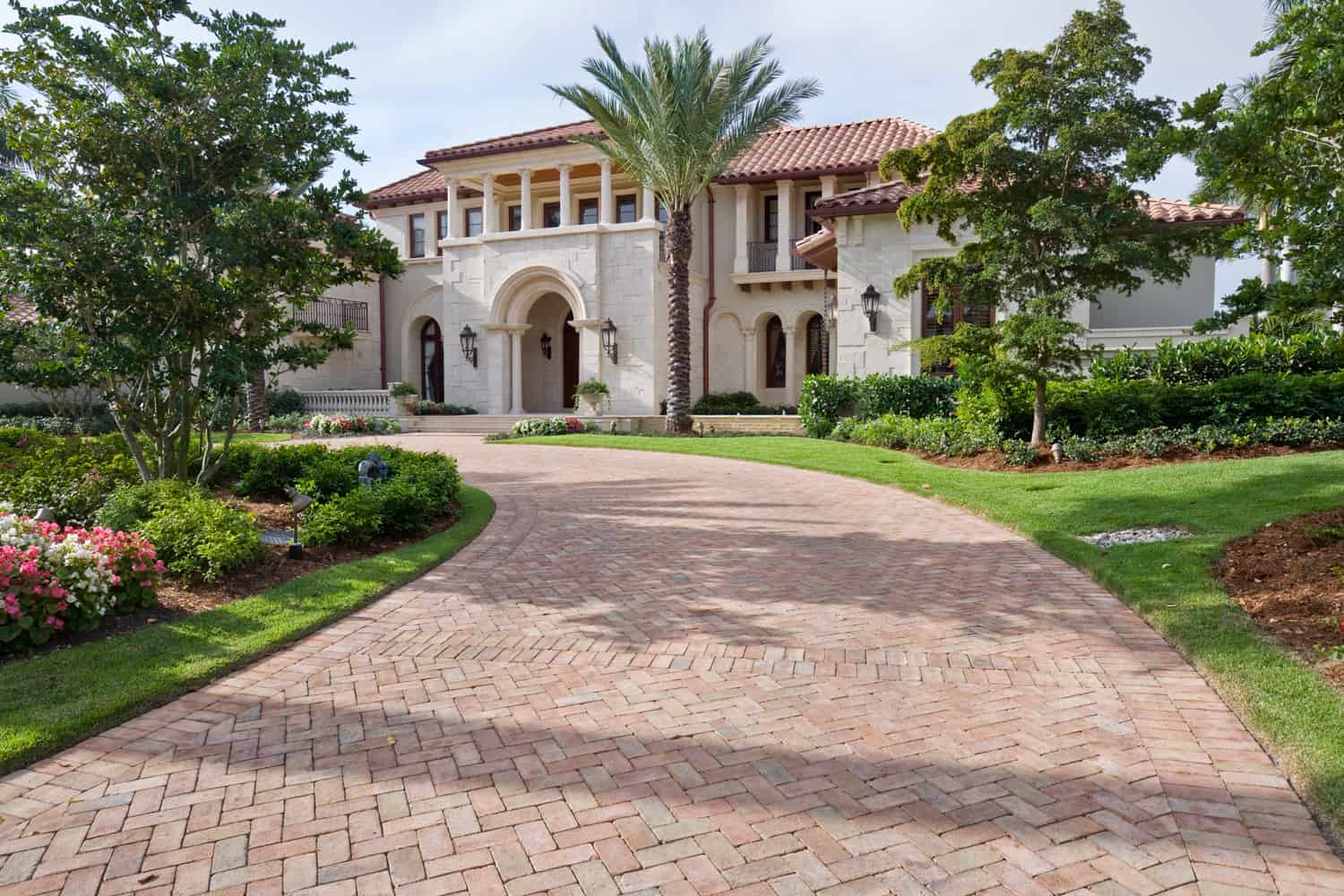
It's important to consider what kind of paver sealant you want to use. Sealants fall into two categories: solvent and Wwter-based sealers.
1. Water-based sealant
Water-based sealants are environmentally friendly! As the name suggests, this substance is non-toxic, making it safe for use and less destructive to the environment. During installation, this sealant does not emit harmful vapors into the air.
When applying water-based sealants, you won't have to be worried about proper ventilation because this substance contains less volatile organic compounds or VOCs.
One advantage of using this sealant is that it is breathable allowing moisture to penetrate through the surface. It is important to use breathable sealants because non-breathable ones will flake and peel in the presence of moisture. Since this substance is thinner, you can use a sprayer to coat your pavers evenly.
It is also advisable to use water-based sealers because this sealant won't darken your pavers. This will help retain the beauty of your paving stones.
Check out this water-based sealant on Amazon.
2. Solvent-based sealant
Many people prefer water-based to solvent-based sealants because they are toxic to the environment. This sealant has a high VOC content which releases harmful toxins into the atmosphere.
Although this is the case, solvent-based sealants also have some advantages. This type of sealant is best used outdoors because it is more durable. It also protects pavers from water and chloride intrusion.
Aside from this, this sealant is UV-resistant and it does not undergo discoloration.
What is the best sprayer for paver sealer?
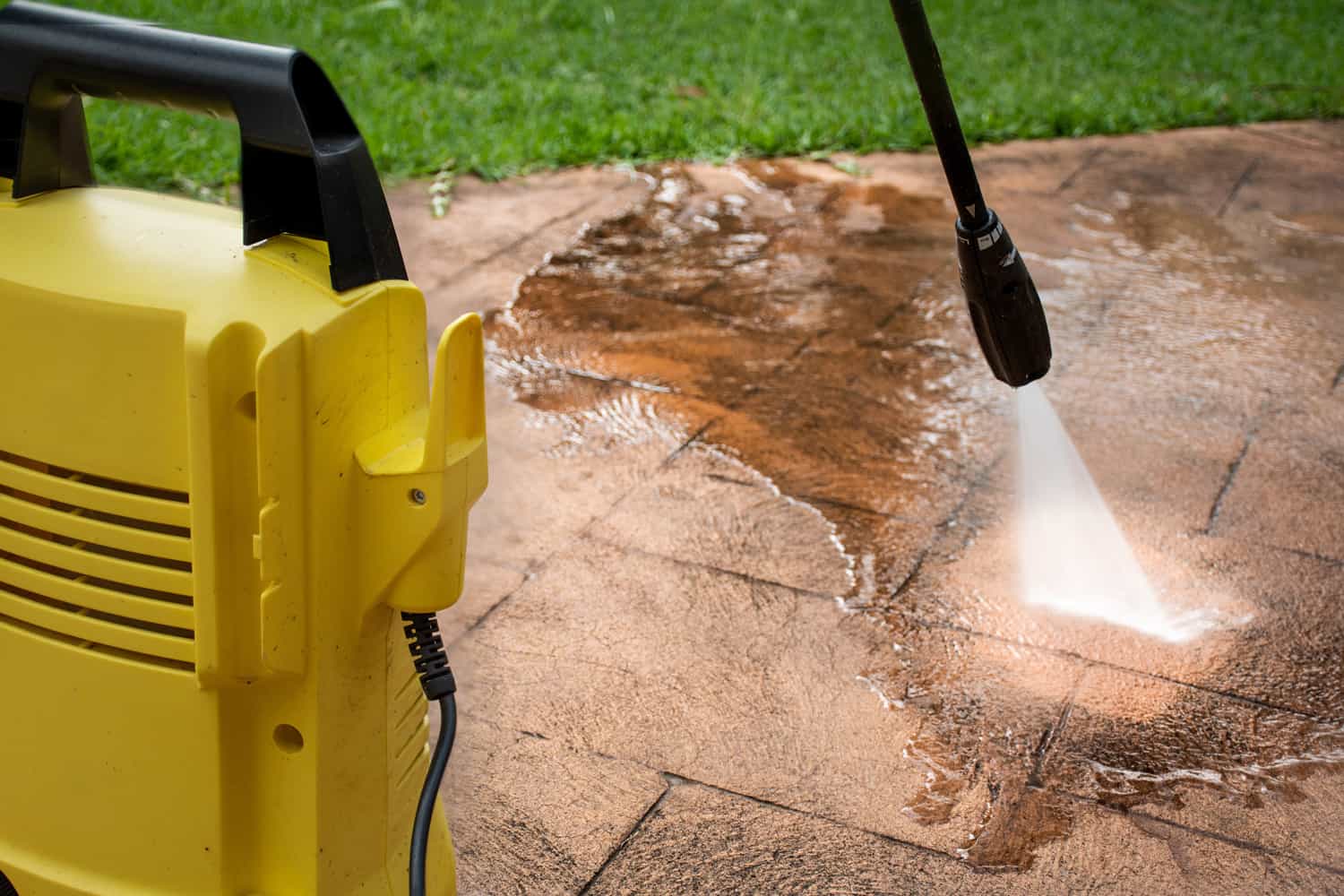
Now that you know the types of sealant for pavers, it is best to find out what instrument you would be using when applying sealer. When deciding which sprayer to use, you will have plenty of options. Each kind of sprayer is different and they have their advantages and disadvantages.
You might be wondering which sprayer best suits your needs. See your options below to assess which one you'd prefer:
1. Standard Garden Sprayer
The most common spray bottle used by contractors is a regular garden sprayer. You might have this lying around your backyard or storage area, so you won't have to spend on it.
This sprayer is the same kind you use for insecticides or fertilizers. However, this is best used with water-based sealants. Since ordinary spray bottles are made from plastic and rubber, they won't be able to handle solvent-based sealants.
Thermoplastics will start to harden and eat up the rubber seals unless you clean the sprayer thoroughly. Because of this problem, you will have to throw away your sprayer after using it.
One important tip is to use a garden sprayer with an adjustable fan tip. It offers you more control when you are applying your paver sealers.
2. Solvent-Resistant Pump Sprayer
This spray bottle is ideal for both solvent and water-based sealants. Solvent-resistant pump sprayers are heavy-duty and chemical-resistant.
This is made to withstand chemical substances from sealants, which is why it will definitely last you years before it gets damaged.
Check out this chemical-resistant sprayer on Amazon.
However, this heavy-duty material cannot handle some penetrating sealers. It is best to ask your local hardware if your sealant is compatible with the sprayer you are using. You can also check the manufacturer’s label on your sealant to avoid problems.
3. Airless and HVLP Sprayers
Airless and HVLP (High-Velocity Low Pressure) sprayers are heavy equipment sprayers that can be used for both water-based and solvent-based sealants. However, just like solvent-resistant pump sprayers, this equipment is not good for penetrating sealers.
The best thing about this type of sprayer is that it has adjustable tips that could make the work easier.
Check out this HVLP sprayer on Amazon.
When applying your sealer, remember that you have to apply at least two to three coatings. Make sure that your sealer does not form a puddle, If this happens, use a paintbrush to evenly spread and smooth it out again.
4. Battery-Powered Pail Pump Sprayer
Using a battery-powered pail pump sprayer does not require more physical effort than those mentioned above.
An advantage of using this equipment is it can cover larger areas in a more convenient time-efficient way. With the right batteries, you can spray seal an area of 3,000 sq. ft. up to 5,000 sq. ft.
Unlike other types of sprayers, battery-powered sprayers are made with metal casings. You can use different kinds of sealers because this equipment can definitely handle anything!
In Closing
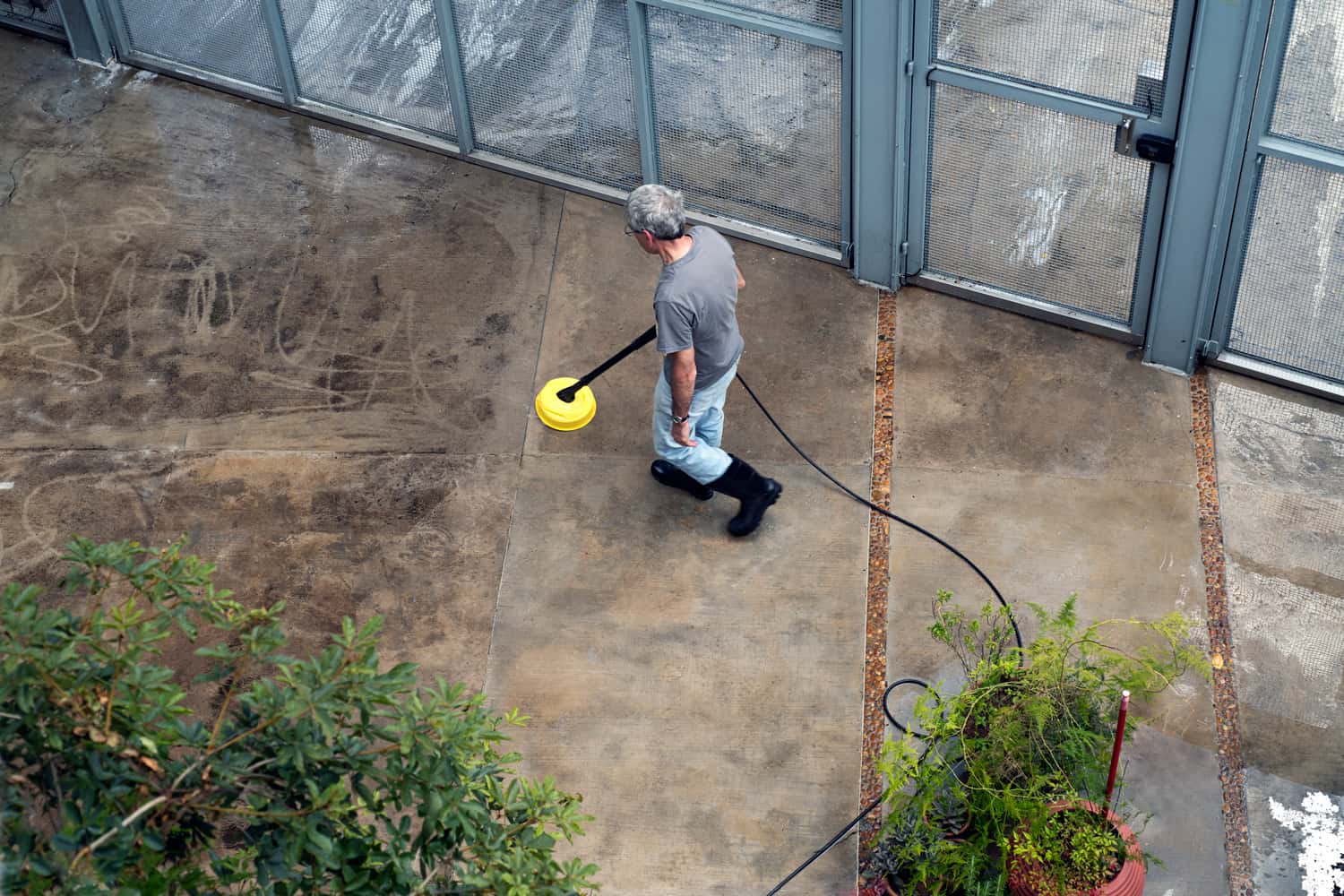
Using a spray sealant is the best method to use when sealing your pavers. It's best to choose the right sealant as well to ensure the safety and longevity of your pavers for years to come.
If you found this article helpful, check out:





![Properly laid out red pavers for a garden, Can You Tint Paver Sealer? [And How To]](https://pavingplatform.com/wp-content/uploads/2022/04/Properly-laid-out-red-pavers-for-a-garden-600x400.jpg)
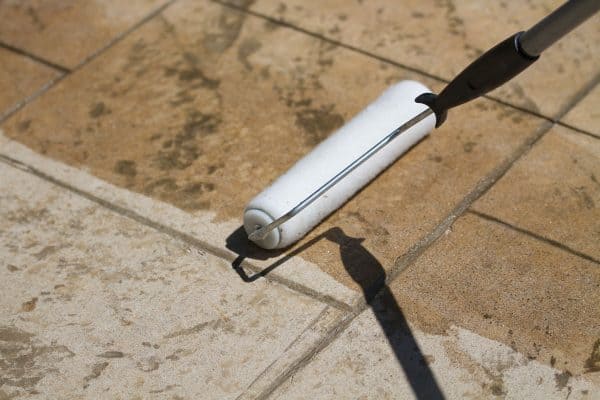
![Garden Patio in Backyard Stone Brick Pavers Hardscape Layout Design Top View, Does Paver Sealer Harden Sand? [How to Stabilize Sand & Prevent Erosion]](https://pavingplatform.com/wp-content/uploads/2022/04/Garden-Patio-in-Backyard-Stone-Brick-Pavers-Hardscape-Layout-Design-Top-View-600x400.jpg)